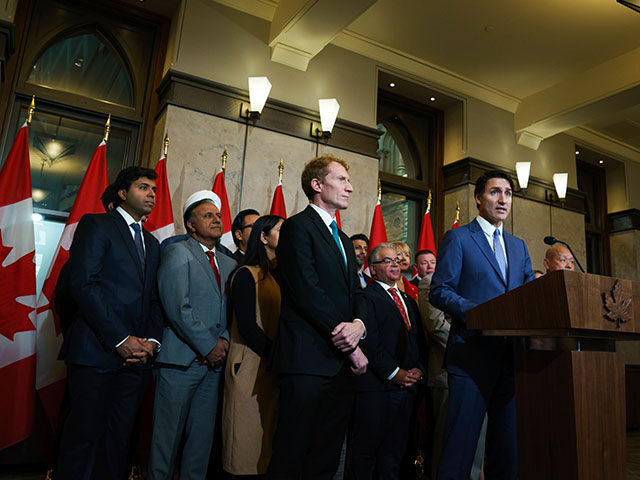Canadian Prime Minister Justin Trudeau is trimming Canada’s legal immigration by just 20 percent as polls show him losing the next national election, due before the end of October 2025.
But Trudeau still insists that foreign migrants — not Canadian ingenuity and birthrates — are vital to growing the nation’s economy, and his supposed cutback actually accelerates the amnesty-like conversion of temporary migrants into Canadian citizens.
The cuts are “temporary — to pause our population growth and let our economy catch up,” Trudeau said.
“Our economy needs newcomers, we see the pressures facing our country, and we must adapt our policies,” said an October 24 statement from immigration minister Marc Miller.
Trudeau’s political rivals say the cutback is too little and too late, amid the expanding poverty, housing spikes, birth-rate reductions, and stalled productivity caused by Trudeau’s agreement with consumer-economy investors to import many millions of desperate workers, poor Indian consumers, and apartment-sharing renters.
Trudeau’s disastrous migration policy has been repeatedly endorsed by President Joe Biden’s pro-migration border chief.
“We look to the north, with Canada,” border chief Alejandro Mayorkas said in September 2024:
Canada takes a look at its market needs, and it says, “You know what? We need 700,000 foreign workers to address our labor needs domestically.” And, so, they build a visa system for that year to address the current market condition. And they say, “We’re going to bring in a million people.” And it’s market sensitive.
We [in the United States] are dealing with numerical caps on labor-driven visas that were set in 1996. It’s 2024. The world has changed. It is remarkable how there can be agreement that [the visas system] is broken and not have an agreement on a solution. The country is suffering as a result of it.
Polls show Trudeau is deeply unpopular, largely because his mass migration policy has wrecked Canada’s economy and society.
“Today’s immigration flip-flop is a massive admission of failure by Justin Trudeau,” responded the leading opposition candidate, Pierre Poilievre, head of Canada’s Conservative Party:
Desperate to save himself from Liberal MPs who want him gone, Trudeau now admits his immigration policies caused housing, health care and jobs crises. But he can’t fix what he broke. Only common sense Conservatives can do that. Call a carbon tax election so we can bring it home
“This is far from being a sufficient reduction,” Maxime Bernier, who founded the pro-Canadian People’s Party of Canada, sharply responded on X.
Trudeau’s cutback, Bernier said, “will only slow down the [migrant] tsunami,” adding:
We need to stop it. And right now.
But it’s nevertheless a huge pivot for a government that literally flooded the country with foreigners and, until recently, was smearing anyone who didn’t agree that wanting MORE immigration was the only acceptable position.
This also confirms that the Liberals now favour a more restrictive immigration policy than Pandering Poilievre’s fake Conservatives, who have never clarified where they stand on this crucial issue as the unserious party that they are.
“Our economy is now smaller than it was in 2019 when adjusted for inflation and immigration, and pretty much in the same place it was a decade ago,” admitted a June 4 report by Canada’s RBC Royal Bank. Amid Trudeau’s migration, “a growing share of savings and investment has flowed to real estate and construction, which, while needed and beneficial for many reasons, are both relatively inefficient and can hold back the overall productive growth of an economy,” the report said.
But Trudeau’s cutback plan still calls for massive migration into Canada’s fast-growing population, which is now roughly one-quarter immigrants.
For example, Trudeau plans to import 395,000 immigrants in 2025, 380,000 in 2026, and 365,000 thereafter. That inflow will deliver four job-seeking migrants for every three students who graduate high school in Canada.
Each year, Trudeau also imports roughly 500,000 supposedly “student” workers — mostly from India — and grants citizenship to many.
The statement said Trudeau’s new cutback will;
Transition … more temporary residents who are already in Canada as students and workers to permanent residents.
Representing more than 40% of overall permanent resident admissions in 2025, these residents are skilled, educated and integrated into Canadian society. They will continue to support the workforce and economy without placing additional demands on our social services because they are already established, with housing and employment.
Trudeau’s announcement came after Canada’s unemployment rate increased 0.2 percent to 6.4 percent in June, according to Statistics Canada. In an update on October 11, Statistics Canada revealed that in September, the “unemployment rate fell 0.1 percent” to 6.5 percent.
Breitbart News has previously reported that a Nanos Research Group poll, which surveyed 1,081 Canadians, found that 68 percent of Canadians felt that increasing the target number for permanent resident immigrants would negatively impact the cost of housing, while 20 percent felt that there would be a positive effect on housing prices.

COMMENTS
Please let us know if you're having issues with commenting.